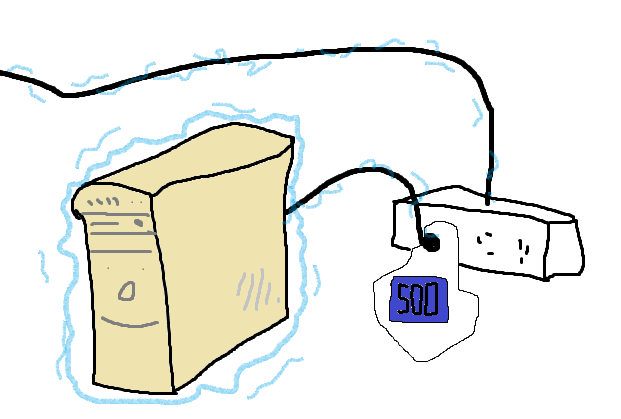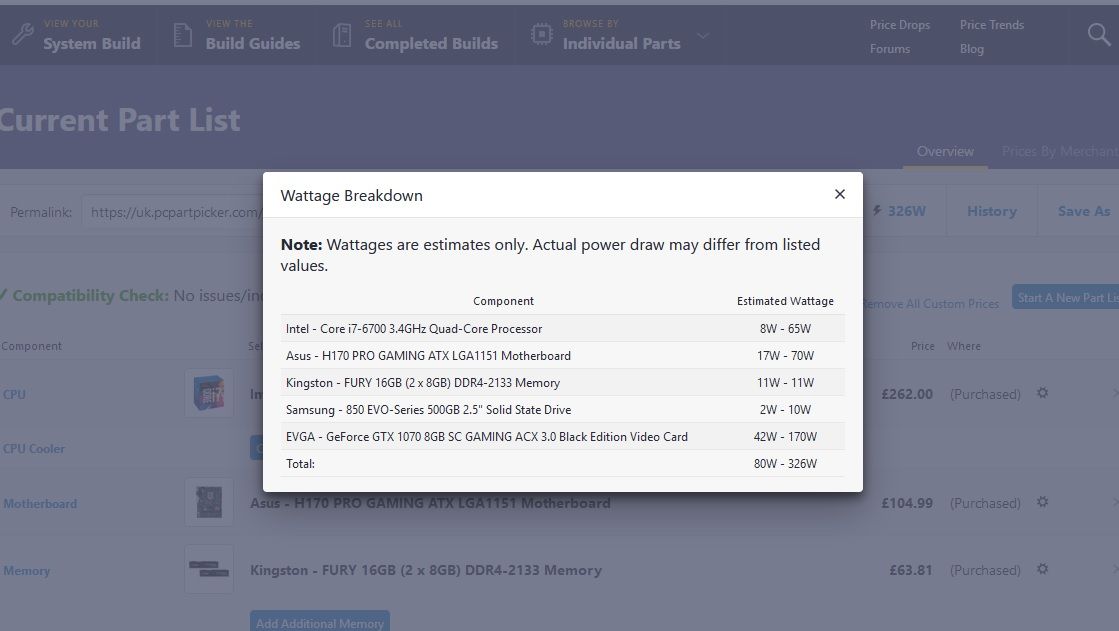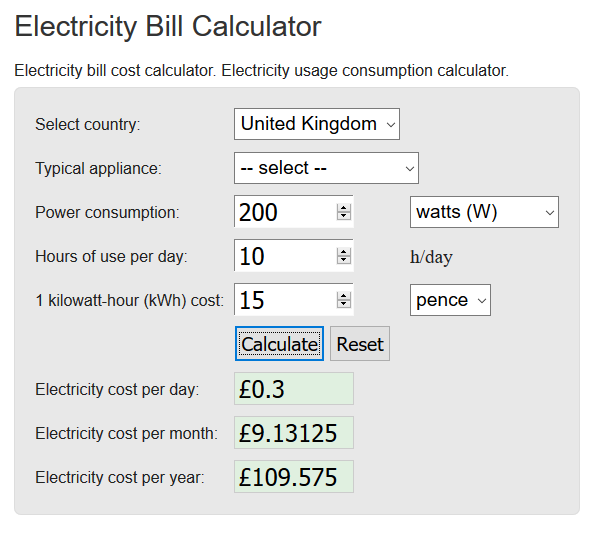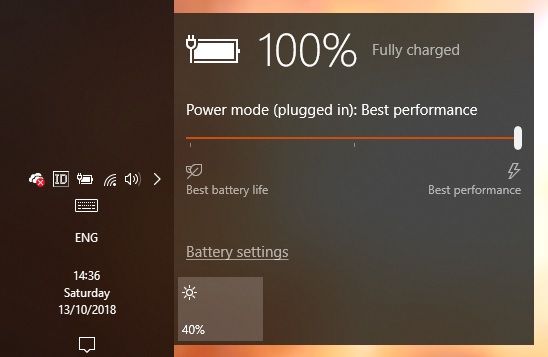Warning: This blog is old and deprecated. It may be wrong or misleading, and it does not represent the author's current positions.
The heat. The light. The sound. It’s all indicative of your computer’s power consumption. But do you know exactly how much of an effect using your device has on your electricity costs? Let’s find out.
insert_linkYour Computer and Your Energy Bill
[caption id="attachment_3138" align="alignright" width="300"]
 When you're paying your bills, remember that your computer could represent a small or large portion of the price.[/caption]
When you're paying your bills, remember that your computer could represent a small or large portion of the price.[/caption]
We all know that computers consume electricity. But have you given your computer’s power consumption much of a thought?
After all, your computer—unless you practise black magic—contributes to your electricity bill at the end of the month. Exactly how much so depends on a multitude of factors, namely the power consumption of your computer.
Furthermore, you will never know whether you would be happy with your computer’s electricity drain until you find out; you can’t judge what you don’t know.
Perhaps your computer is using costing far less than you previously expected. Perhaps your computer is consuming far more than what you’re happy with. Or, maybe, its power consumption is just right.
Regardless, we can all find out together—as one (one entity). In addition to that, we will briefly hop through the realm of power saving techniques.
insert_linkWhat Affects Your Computer’s Power Consumption?
The efficiency of components: arguably the key factor in deciding whether your computer is consuming too much power.
The efficiency of components is essentially how much useful work they do for the amount of energy consumed. Accordingly, computers that are more efficient consume less power for the same amount of work. To illustrate:
Efficiency = useful output ÷ energy input
Needless to say, a more efficient computer—full of efficient components—is doubtlessly the better option; who doesn’t want the same amount of performance for a smaller cost on the energy bill?
Also, good, yes: 7 Online Productivity Tools: Never Waste Your Time Again
Components sporting minimal power consumption can boast a reduced amount of waste heat, too.
Occasionally one could thank a spicy-hot computer in the Winter, though.
Additionally, older computers do not tend to match the efficiency of modern electronics. This is simply because these devices are being refined over time to become more and more power-efficient.
Usually, it is a dedicated GPU and CPU which use the most electricity in your computer. Although, the CPU, in many cases, uses considerably less power than a dedicated GPU.
As a final note on this section, your usage habits matter as well.
How often do you use your computer? What do you use your computer for? How well do you manage programmes and the operating system etc?
insert_linkFinding Your Computer’s Power Consumption

insert_linkWhy You Think It Will be Easy, But It Won’t
“Oh—wow—this is truly easy! I’ll just dump some numbers into an online calculator and it will spew out the results I need!”
No.
Calculating the power consumption of your computer is a long way away from straightforward. Indeed, you can find the power rating of your computer, but that doesn’t tell the entire story.
For you see, a computer isn’t constantly churning through the same amount of energy; power consumption can vary drastically depending on how hard the device is working.
For instance, if your computer is idling around and you aren’t doing anything to it—expect a low power consumption. By contrast, relentlessly chugging through a resource-intense game or rendering a scene will invariably suck countless electrons out of the plug socket.
Therefore, finding the average electricity you consume using your computer is exceedingly difficult.
That being said, you can get an idea of how much your computer costs using numerous calculators.
insert_linkHow to Attain the Data—But Not Like Zuckerberg
Don’t sell your privacy: Private Internet Access vs NordVPN? The Best Deal (2018)
If you’re using a pre-built computer, the manufacturer may state the power consumption online. Otherwise, you’d first have to compile a list of all the components in your computer.
Secondly, you will need to find the power consumption range of each. PCPartPicker does this all very nicely for you.
Perhaps, now, you know the idle and load power of your computer, ready to put into a calculator. Prior to that, though, make sure you know your electricity cost per kilowatt-hour (kWh).
Next, go to this webpage and fill out the necessary fields, then click calculate.
While this method provides an estimate of your power usage, nothing beats the real deal: a power meter. Using a power meter, you will be able to see exactly how much energy your computer is consuming at any given time, as well as how much it’s costing you.
More importantly, though, you could probably use it to see how much a month’s usage costs you. This is perhaps the best (most accurate) way to find out how much of an effect your computer has on your energy bill.
[caption id="attachment_3140" align="aligncenter" width="1119"]
 Get a parts list on PCPartPicker—it's great![/caption]
Get a parts list on PCPartPicker—it's great![/caption]
insert_linkHow to Know If Your Computer is Costing Too Much Energy
All right. So, using the techniques discussed above (preferably the power meter method), you should calculate how much your computer costs you per month or year.
As a result, you should begin to get a better perspective of how it impacts your energy bill.
Better yet, divide your computer’s monthly cost by your total monthly energy cost to get a decimal. Subsequently, multiply that by 100 in order to find the percentage of power your computer consumed in that month.
Next, ask yourself, is this cost significant?
A computer costing about £10 per month may not be insignificant. That is unless your monthly energy bill is comparable to Tim Cook’s wealth.
Another key factor to consider is the usefulness of your computer. In other words, is it an essential aid for every second it’s burning those big calories?
Of course, the energy cost is worth it if you get plenty of value out of the machine. Like your car—keep it fed and it will serve you beautifully (maybe).
Macs have efficient hardware: Are Macs Worth It? Most Revealing Arguments from a PC User
Also, leaving your computer on when it is doing nothing is obviously a folly. I know you are guilty of this; I can see.
In which case, we are led seamlessly into the next bucket of information: how you can minimise your computer’s power consumption, hence cost.
insert_linkWays You Can Save Power—and Money

insert_linkConsider More Power-Efficient Hardware
The first—and arguably least practical—approach to reducing your computer’s power consumption is a change of hardware.
That is to say, if it really matters that much to you, invest in power-efficient hardware.
However, I recognise that you probably have a satisfactory computer right in front of you. I, therefore, wouldn’t advise you to replace your computer—that’s counterproductive.
It’s probably cheaper to pay a heavier energy bill than to carve out a hole in your wallet for an entirely new machine.
With that in mind, keep power efficiency as well as overall consumption in mind when you next buy a new computing device.
insert_linkSleep, Hibernate and Shut Yourself Down
Secondly, take advantage of sleep and hibernate modes whenever you’re not currently using your computer. This enables you to retain your open applications without ploughing through masses of electricity.
Even though they make your computer look like it’s doing nothing, it will continue consuming power. There is no escape from shutting down your computer when you don’t need to keep your apps active.
insert_linkTake Advantage of Your Operating System’s Power-Saving Features
 Thirdly, Windows (and other OSs) provide numerous ways to reduce the power it demands.
Thirdly, Windows (and other OSs) provide numerous ways to reduce the power it demands.
This includes a “power plan” which you can find and edit in the Control Panel. Typically, you would be able to select a balanced or power-saving power plan if energy consumption was of your concern.
Moreover, you could use a battery-saver feature of your laptop, which isn’t restricted to Windows this time. This basically cuts down the work your computer does in order to reduce the need for energy.
insert_linkBe Careful with Your Screen
A good screen is always worth it: MX27AQ Review: Perfect Monitor for Cheap Professionals
Fourthly, I’d advise that you turn off your monitor in the event that you’ll be away temporarily. Say, if you expect to be gone for at least a minute.
After all, it’s not just the computing horsepower that necessitates for all this electricity—it’s the screen, too.
On a laptop, you could close the lid but also reduce the screen brightness when blinding yourself is unimportant.
insert_linkExploit the Powerless Power of Timeouts
Finally, it would be wise to configure a few timeouts. They may be small, yet they are powerful.
But wait—they are not powerful, because they make your computer less powerful; timeouts can potentially help you save power when said power is not required at that particular point in time.
For example, in your computer’s settings, you should be able to set a screen timeout. Consequently, after a chosen length of inactivity, your computer will turn off the screen.
In addition, after a longer period of inactivity, you could choose to have the computer enter sleep mode.
Considering that most of your computer’s power consumption is probably wasted when you’re not getting anything useful out of your computer, this feature could be tremendously life-saving. Or, rather, power-saving.
Your computer will automatically save power when you forget to do so. Clever—no?
insert_linkBonus: Just Use Linux
Windows is thick and bloated, meanwhile, Linux is generally lightweight and gentle on your computer. Thus, one can expect it to be gentler on your energy bill.
Consider it then, especially a popular distribution such as Ubuntu (my personal favourite). With that said, it’s not all happy and glowing with laughter.
Feed yourself: Why I Abandoned Dual Boot and Finally Gained Back Freedom
insert_linkA Final Message
 To wrap this up, the most important thing to consider is whether you think you get sufficient value for what you pay in electricity costs.
To wrap this up, the most important thing to consider is whether you think you get sufficient value for what you pay in electricity costs.
The conclusion of this is entirely up to you—should your computer be on for as long as it currently is? Can you employ any power-saving techniques to help you save some money? I don’t know, is it safe?
If you haven’t already, get a power meter. I assure you that the insights it will provide (not just of your computer, but anything else) will be worth the tiny investment.
Next up, you can save money if you happen to have an old laptop lying around. Why not?
Also, don’t hesitate to comment with your insight—just ignore the fact that my comment system isn’t working right now. (I hope to fix that… sometime.)
Read Next: How to Use Your Old Laptop as a Second Monitor (5 Ways)


